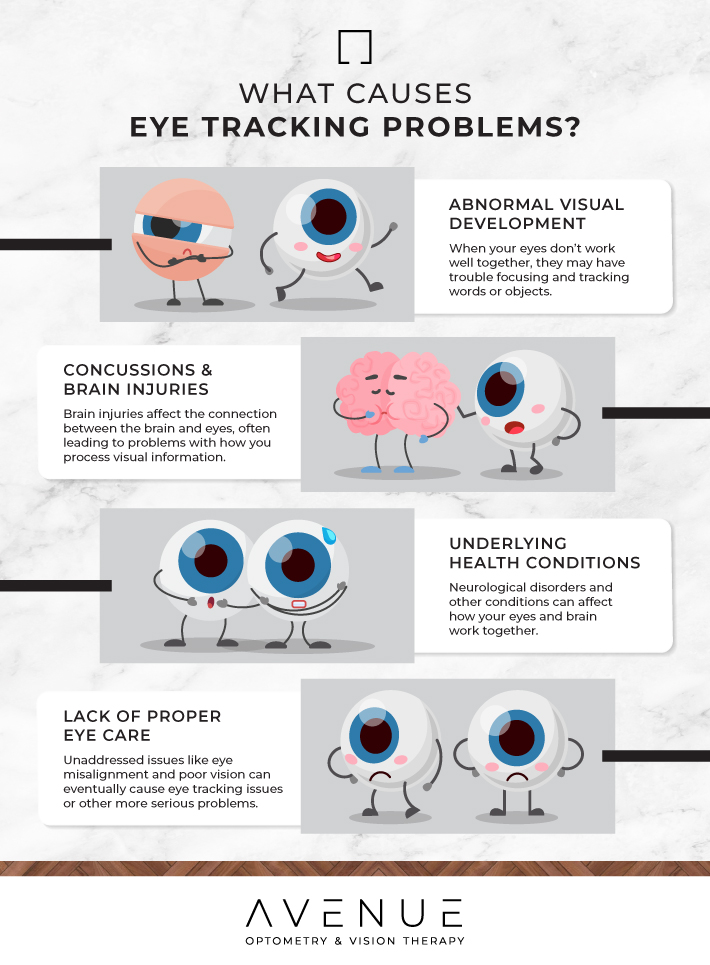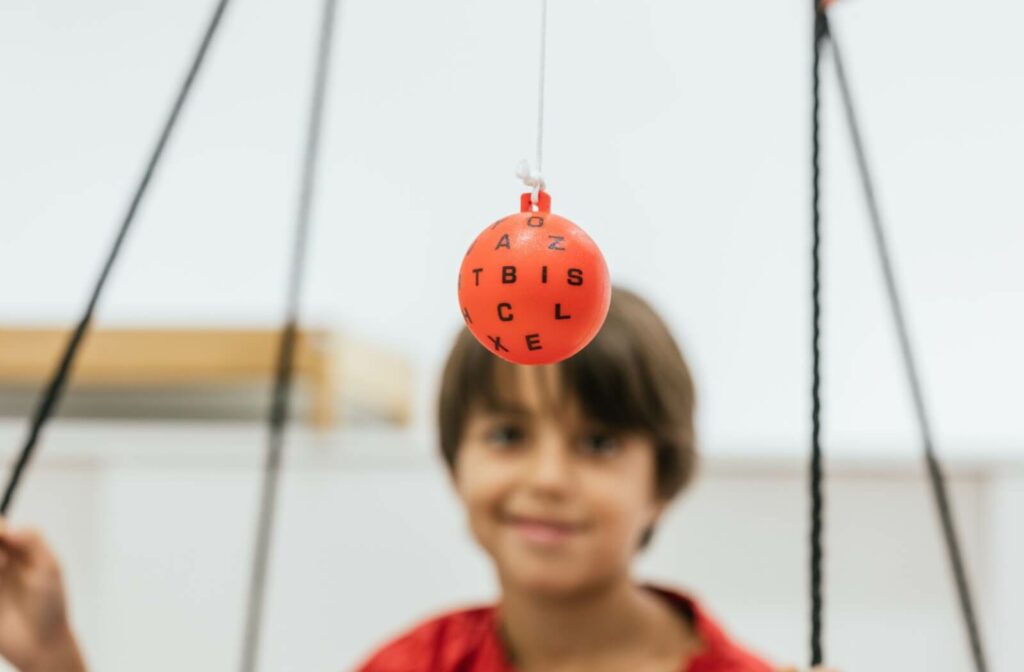Our eyes are constantly moving, whether we’re aware of it or not. This motion is controlled by the brain and allows us to follow text smoothly and focus on moving objects.
But sometimes, developmental challenges, brain injuries, or age-related changes can disrupt this essential connection between the eyes and brain. When that happens, we can struggle to track words or objects, making tasks like reading, writing, playing sports, and managing daily routines harder than they should be. These difficulties are often due to eye tracking or visual tracking issues.
What Is Eye Tracking?
Your brain and nervous system work together to coordinate eye movements, allowing your eyes to move in sync. When your vision is healthy, your eyes move smoothly and accurately, supporting strong eye-tracking skills.
These skills are essential for following moving objects, switching focus quickly (like when reading), and efficiently processing visual information. Strong eye tracking is also crucial for reading comprehension and effective visual processing.
If your eye movements are jumpy, slow, or generally unreliable, you can experience symptoms such as:
- Reading difficulties
- Eye squinting
- Concentration issues
- Double or blurry vision
- Eye fatigue or discomfort
Why Do Eye Tracking Errors Happen?
Abnormal development of the visual system or neurological disorders can disrupt the coordination between the eyes and brain, impairing normal tracking abilities. This can make it difficult for the eyes to move smoothly or focus on a specific target.
These developmental issues may include eye alignment problems, such as:
- Strabismus (crossed eyes)
- Amblyopia (lazy eye)
- Convergence insufficiency
What Is Abnormal Visual Development?
Abnormal visual development occurs when the eyes and visual system do not develop properly, leading to any number of vision problems, including refractive errors (nearsightedness, farsightedness, or astigmatism), eye misalignment, eye tracking difficulties, nystagmus, among others. These issues can stem from genetic, environmental, or combined factors.
Healthy visual development is essential for the brain and eyes to learn to work efficiently together. When this process is disrupted, it can impact the coordination between the eyes and brain.
While some vision problems can be corrected with eyeglasses (such as refractive errors), it does not address the underlying developmental issues affecting eye function. For conditions like rapidly progressing myopia, strabismus, or amblyopia, additional treatments may be necessary to protect long-term vision and support eye health.
What Causes Eye Tracking Problems in Adults?
Eye tracking problems are often associated with children, but they can also persist into adulthood or even develop later in life due to:
- Age-related changes like declining visual acuity and flexibility
- Neurological conditions like Parkinson’s disease
- Concussions, strokes, and other brain injuries
- Lifestyle factors like prolonged screen use and lack of proper eye care
Good eyesight is often mistaken for healthy vision, leading many to think only those who need glasses require eye exams. But vision is a complex process involving the eyes, brain, and visual pathways.
Regular eye exams are essential for everyone to monitor eye health, detect issues early, and address problems before they worsen. Without proper eye care, vision issues like eye tracking problems may become more significant over time.

What Does Poor Visual Tracking Indicate?
In children, poor visual tracking can indicate developmental issues like crossed eyes or lazy eye. These conditions won’t resolve on their own—children with strabismus or amblyopia will continue to have these issues into adulthood if left untreated.
In adults, eye tracking issues may point to underlying neurological concerns. For instance, concussions and strokes are known to impact eye tracking, so these symptoms could indicate a previous brain injury that warrants medical evaluation. Eye tracking problems in adults may also signal neurological conditions that affect the pathways responsible for controlling eye movement. In older adults, poor visual tracking can sometimes be associated with cognitive impairment.
How Do You Improve Eye Tracking Skills?
Eye tracking issues are a visual skill that can be strengthened with vision therapy. Vision therapy is a comprehensive, non-invasive approach designed to develop and refine visual skills, including eye tracking. This program uses evidence-based techniques to retrain the brain and visual system, improving coordination and functionality.
What Is Vision Therapy?

Vision therapy involves a series of techniques aimed at strengthening the brain-eye connection, improving how you process and interpret visual information.
Vision therapy can help:
- Children with visual development issues
- Children who struggle with focus in school
- Athletes looking to enhance their vision
- Adults with eye misalignment
- Those experiencing lingering visual symptoms after brain injuries
Each vision therapy program starts with a detailed assessment to identify specific concerns and develop a tailored treatment plan. Since every individual’s needs are unique, no 2 programs are the same.
Improve Your Visual Skills with Avenue Optometry & Vision Therapy
Strong vision goes beyond clear eyesight. Your visual skills involve eye tracking, focus, visual perception, and eye alignment, which are all important parts of healthy vision.
Normal eye tracking is crucial for maintaining optimal visual health and function. If you experience problems with eye tracking, don’t hesitate to contact our team at Avenue Optometry & Vision Therapy. We can create a vision therapy program that suits your needs.



